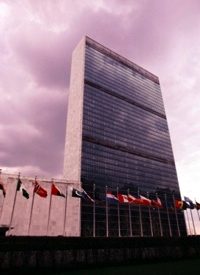
United Nations delegates to the upcoming Climate Change Convention in Copenhagen are preparing to propose a UN-centered environmental world government with authority to override local, state, and national governments worldwide for the sake of environmental sustainability. Spear-heading the movement is the United Nations Environment Programme (UNEP), which will offer components of its Medium-term Strategy 2010-2013: Environment for Development for consideration at the conference, set for December 7-18.
The inspiration for the UNEP strategy is a document entitled The UNEP We Want, written by Mark Halle, the director of trade and investment for the International Institute for Sustainable Development (IISD), an environmental research organization. According to George Russell with Fox News, Halle wrote The UNEP We Want after an un-publicized meeting with 19 other leading environmental policy makers in 2007, including other UN and UNEP officials, and representatives from the World Conservation Union, the World Economic Forum, and the Yale Center for Environmental Law and Policy. UNEP official John Scanlon, who also attended the 2007 meeting, is the principal author of the Medium-term Strategy 2010-2013.
Russell reports proposals contained in the two documents closely resemble each other, the only exception being the IISD paper is much more direct and explicit in its language. For example, The UNEP We Want reads, “The environment should compete with religion as the only compelling, value-based narrative available to humanity.” While the official strategy does not call for a global environmental religion, it does posit, “We must spare no effort to free all of humanity … from the threat of living on a planet irredeemably spoilt by human activities,” suggesting that there is “renewed emphasis on the future evolution of international environmental governance, including calls for greater coherence within the United Nations system, for harmonization of aid under a new architecture, for increased focus on the role of the private sector, for national ownership of development programmes and for results-based management.”
The two documents recommend a number of other changes in international environmental policy according to Russell. Both demand that environmental issues be considered central to political and economic decision-making worldwide, and in relation to that, each calls for increased funding of the UNEP by governments and the private sector as well as an “evolution” of increasing power over national governments’ rule-making authority. Their ultimate goal is to set up the UNEP as the world’s final arbiter of environmental issues. But their vision for UNEP authority does not stop with the environment. The two documents suggest merging environmental and economic decision making in regard to public policy and determining “future markets opportunities,” as stated in the strategic plan. They also announce the intention to indoctrinate “children and youth” with the UNEP mission “without appearing to make an end-run around the member governments,” a warning added by Halle in the IISD paper.
In an interview with Fox News, Halle claimed that the first stages of the UNEP strategy are already underway in the form of the Green Economy Initiative, or Global Green New Deal, which calls for trillions of investment dollars in the global economy to be diverted to developing countries worldwide in the form of “new green jobs” and an end to “carbon-based energy subsidies.” The Green Economy Initiative is a major component of the treaty on greenhouse gas suppression up for debate in Copenhagen.



